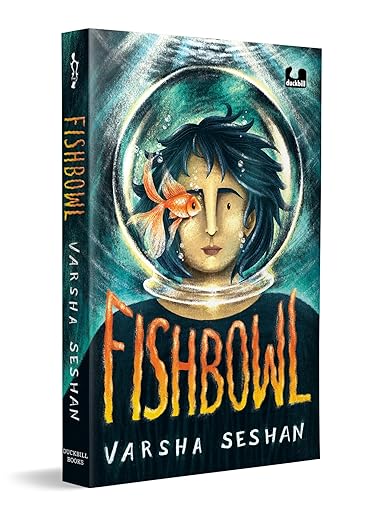Fishbowl: A story written in verse, showcases grief and finding a way to heal
My take on the book:
Mahee Ranjan lost both her parents in a tragic car accident; Mahee is now living with her uncle and aunt Deep and Sanam in Pune and has newly joined Spectrum School. Mahee’s parents had a troubled marriage and were constantly fighting which made Mahee wish at times for it all to end. When they died suddenly, Mahee felt guilty that she could have alerted them sitting in the back seat when their car was about to be crushed.
Mahee is also overwhelmed by grief and shame that she is living a normal life days after such tragedy. These strong emotions made her withdraw from everyone around her, along with recurrent nightmares. Whenever she wished to respond in a normal way to her new family members or to her classmates, Mahee’s conscience was taken over by grief, guilt and shame.
When the class representative Ridhima Rana overheard the Principal mention about the new student Mahee, Ridhima assumes Mahee is her new project, to show off to her classmates her empathy to a newly orphaned classmate. Ridhima is very stubborn and is used to being hyped by her close friends as Princess. There is also Aditi in Mahee’s class who is naturally empathetic and understanding towards Mahee.
Will Mahee be able to come out of the trauma of her parent’s death and will she be able to survive school where kids like Riddhima constantly annoyed her, forms the rest of the story.
The story handles a very important topic — grief and the many stages of it, especially when hit suddenly by tragedy like Mahee at a very tender age and how her entire world turned upside down in a moment. The other unique feature of the book is the writing style — verse novel; this style somehow makes the heavy topic not difficult but more immersive.
Mahee’s fishbowl analogy to her emotions and how they overwhelm and crush her, threatening to break is a very well thought idea by the author. The author handles the topic of grief in a very sensible manner in multiple ways — that Mahee as well as her guardians definitely need therapy to handle PTSD the right way, where Aditi got her empathy from and how Riddhima’s approach towards Mahee is not normal and needs to be addressed seriously.
There are parts in the middle where the story drags as similar sequences repeat; while it is realistic for Mahee to take time to come out of her situation, it feels like slow pace for the reader. However, the author compensates with good twists in the story making the last parts again interesting. As grief is a part of life and cannot be escaped, this story offers ways to handle it and heal from it.
Highly recommended for young adults as well as for adults.
My rating:
4/5.
